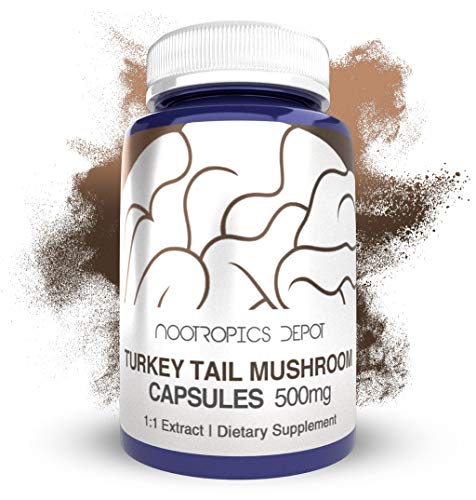Turkey Tail Mushroom (Trametes versicolor)
Medicinal Mushrooms
Overview
- Turkey Tail (Trametes versicolor) is a sap-rotting, shelf-stable fungus.
- It grows on decaying hardwoods worldwide.
- It has been used in traditional Asian medicine for centuries.
- Modern research focuses on its rich polysaccharide-protein complexes (e.g., PSK, PSP) that modulate immune function and support overall health.
Chemistry
- β-Glucans: High-molecular-weight β-glucans (average molecular weight 10⁴–10⁶ Da) composed of repeating units of β-D-glucose (C₆H₁₀O₅)n linked via β-1,3 and β-1,6 glycosidic bonds.
- Protein-Bound Fraction (PSK/PSP): Contains a polysaccharide core (C₆H₁₀O₅)n with attached peptide chains (average 10–30 kDa) rich in lysine, arginine, and aromatic residues.
- Phenolic Constituents: Includes gallic acid (C₇H₆O₅) and quercetin (C₁₅H₁₀O₇), which contribute antioxidant activity.
- Extract Characteristics: The overall extract is a complex, non-crystalline polymer.
- β-Glucan Description: The β-glucan backbone can be described as (1→3)-β-D-glucan with (1→6)-branching.
- Standardization: The extract’s “polysaccharide-protein” complex is typically standardized to ≥30 % total polysaccharides (β-glucan) and ≤5 % heavy metals, meeting USP/EFSA specifications.
Sources & Quality
- Wild Harvesting: Wild Turkey Tail is harvested from temperate forests in North America, Europe, and Asia (especially China, Japan, and the United States).
- Commercial Production: Commercial supplements are usually produced from cultivated strains grown on sterilized hardwood sawdust or grain substrates in controlled, GMP-certified facilities.
- Extraction Methods: Extraction methods include hot water extraction followed by ethanol precipitation to isolate the polysaccharide-protein complex (PSK/PSP).
- Bioavailability Enhancement: Some manufacturers apply enzymatic hydrolysis to increase bioavailability.
- Quality Control:
- HPLC-fingerprinting for polysaccharide content.
- LC-MS for phenolic profile.
- Heavy-metal testing (lead, cadmium, arsenic) to meet FDA/EFSA limits.
- Certifications: Look for third-party certifications (e.g., NSF, USP) and a certificate of analysis confirming ≥30 % polysaccharides and minimal contaminants.
Where to Buy Turkey Tail Mushroom (Trametes versicolor)






Affiliate Disclosure: We earn a commission if you purchase through these links at no additional cost to you. This helps us maintain our research and provides you with the best supplement information.